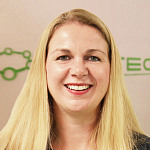
Meet Dr. Katerina Ornerová, who is Head of the Strategy and Science Department at the Central European Institute of Technology (CEITEC) – Masaryk University in Brno, Czech Republic and is Work Package Leader for Analysis and Benchmarking in the ORION Open Science project.
Firstly, tell us a bit about CEITEC
The Central European Institute of Technology – Masaryk University (CEITEC MU) is an independent university institute, which was established at Masaryk University as part of the CEITEC - CEO Center of Excellence. CEITEC MU is a key part of the state-of-the-art research infrastructure that was built in 2014 at the University Campus in Brno–Bohunice and provides top equipment and optimal conditions for basic and applied research, especially in the field of life sciences.
The main priorities of CEITEC are the international dimension of research cooperation and its interdisciplinary nature, which create optimal conditions for addressing multidisciplinary issues in the areas of structural biology, genomics, proteomics, molecular medicine, neuroscience, nanotechnology and microtechnology.
What comes to mind when you talk about Open Science?
Open Science is the movement to make research publicly accessible with no or minimal restrictions. Behind this terminology, I see collaboration between researchers and stakeholders, sharing of information and knowledge, openness, progress and fair-play.
What is the motivation behind CEITEC getting involved in the ORION Open Science project?
CEITEC is a young progressive research institute that supports Open Science and Responsible Research and Innovation (RRI). Therefore, there is no surprise that we are part of such a great community such as the ORION project. Through participation in the ORION project, CEITEC will continue to further develop and implement the principles of Open Science and RRI in our research process and procedures.
What do you hope to achieve through the project?
ORION is encouraging our researchers and research support professionals to be more aware of Open Science and RRI principles and to implement them in our own principles.
What do you see is the greatest challenge for ORION?
The greatest challenge? That the cultural change within life science institutions required to embed Open Science and RRI principles is not manageable. Another challenge for the scientific community is the duration of the project as change takes time. The greatest challenge for ORION is to initiate the transition of cultural change and ensure it continues in the future.
What do you personally find the most interesting and exciting about the ORION project?
The results of first analysis and benchmarking that has been done within the project are particularly interesting. In general, the enthusiasm of the people involved in the project and the participants in our ORION workshops.
In one year, when the project is coming to an end, what is your dream scenario for ORION?
That we have reached all of our objectives and that we have found a way to continue with the important and valuable activities that encompass Open Science and RRI. To share the project’s results, practices and other outcomes with the wider life sciences community behind the ORION family.